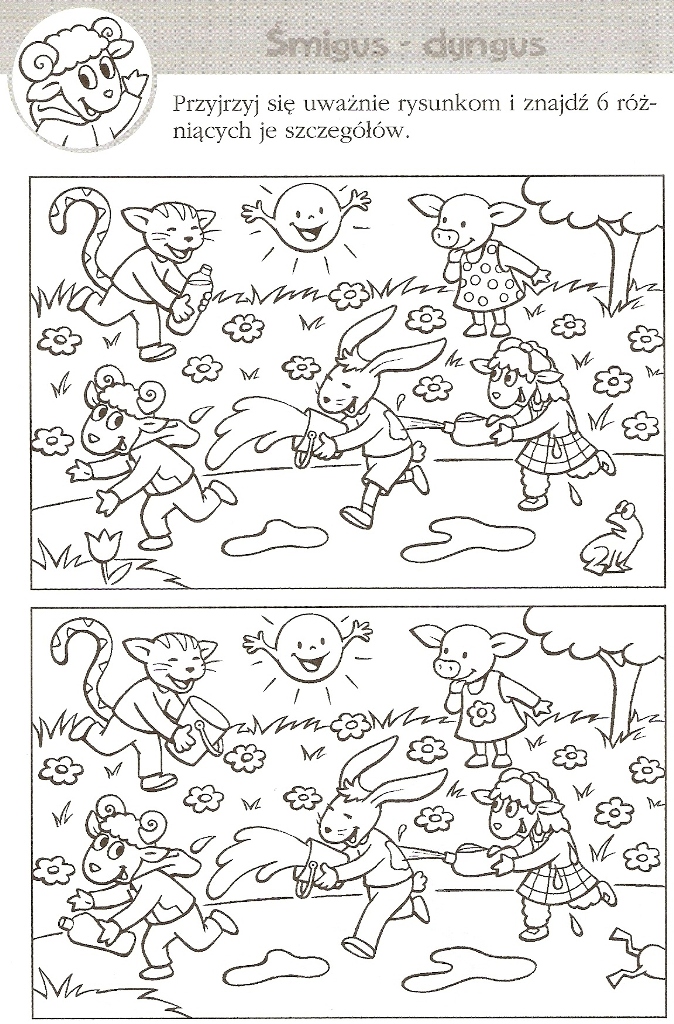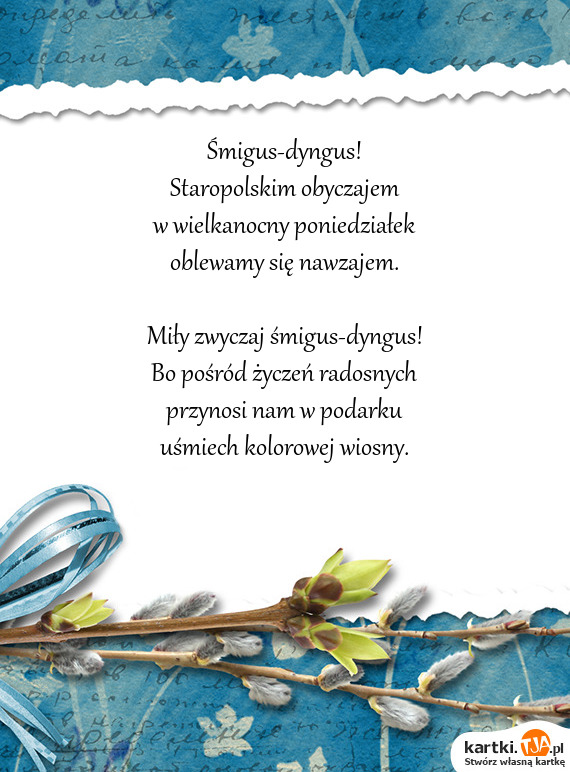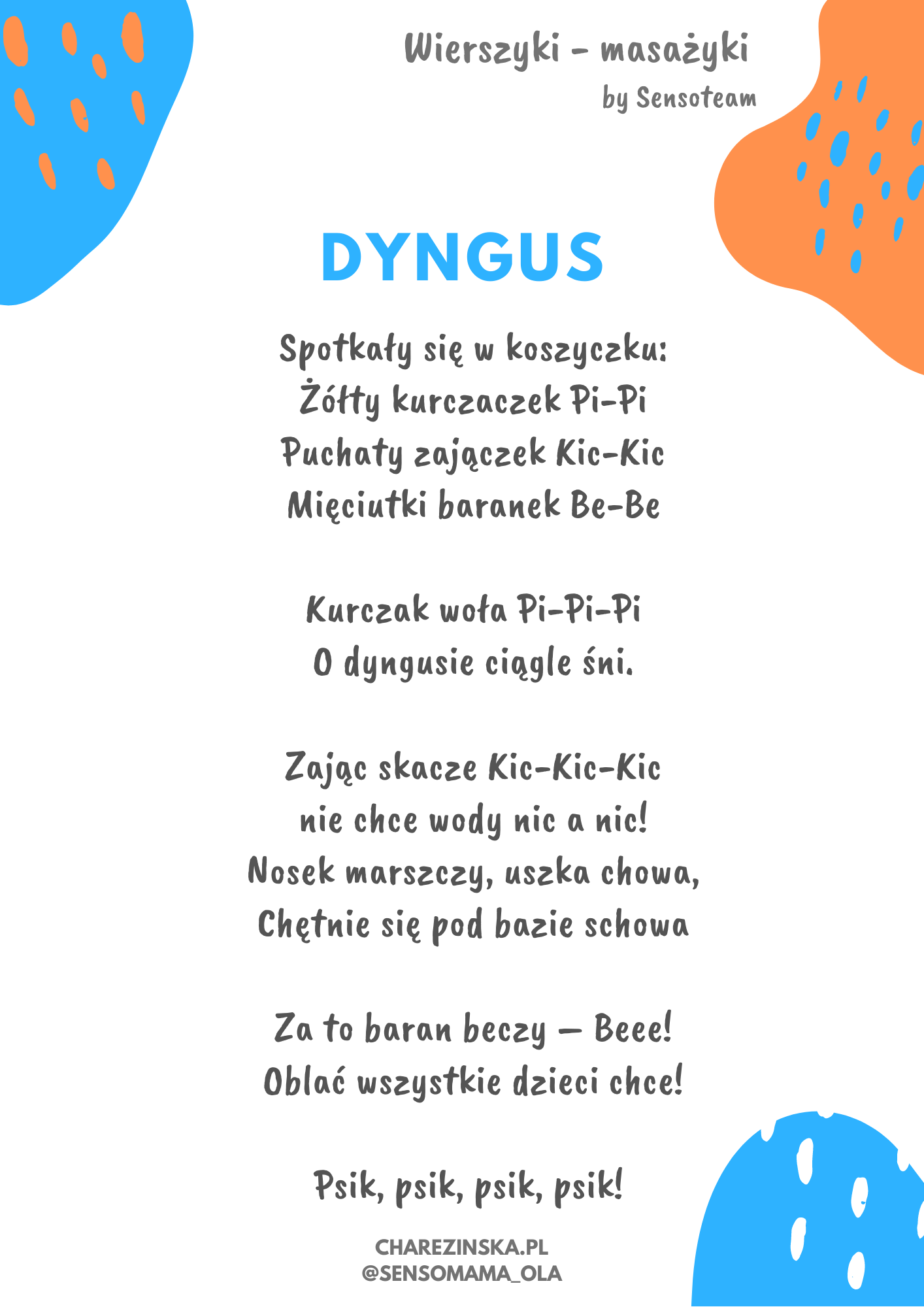Learn about the origins and customs of Śmigus-Dyngus, a Polish Easter Monday tradition of throwing water at each other. Find out how this harmless ritual has turned into a full-blown national water fight involving anyone and anything.
Śmigus Dyngus is a Polish festival that takes place on Easter Monday, where people throw water on each other. Learn about its history, meaning, and how to survive or enjoy this fun custom.
Śmigus-dyngus (znany także jako: lany poniedziałek) - zwyczaj pierwotnie zachodniosłowiański, a wtórnie związany z Poniedziałkiem Wielkanocnym w kościele katolickim. Współcześnie posiada wiele regionalnych nazw. Śmigus i Dyngus przez długi czas były odrębnymi zwyczajami. Z czasem tak się zlały ze sobą w jeden, że przestano
Lany poniedziałek, inaczej śmigus-dyngus obchodzimy w Poniedziałek Wielkanocny. Lany poniedziałek wiąże się ze tradycją oczyszczania wodą. Dziś ten zwyczaj kojarzy się z Wielkanocą i funkcjonuje również pod nazwą śmigus-dyngus, choć kiedyś były to dwa całkowicie odrębne zwyczaje, które dopiero z czasem uległy połączeniu.
Smigus-Dyngus is a Polish tradition of splashing water on Easter Monday, rooted in ancient Slavic rituals and Christian symbolism. Learn about its origins, modern variations, and cultural significance in this article.
Śmigus Dyngus is a Polish festival that takes place on Easter Monday, where people throw water on each other. Learn about its history, meaning, and how to survive or enjoy this fun custom. Śmigus-dyngus (znany także jako: lany poniedziałek) - zwyczaj pierwotnie zachodniosłowiański, a wtórnie związany z Poniedziałkiem Wielkanocnym w kościele katolickim. Współcześnie posiada wiele regionalnych nazw. Śmigus i Dyngus przez długi czas były odrębnymi zwyczajami.
Z czasem tak się zlały ze sobą w jeden, że przestano Lany poniedziałek, inaczej śmigus-dyngus obchodzimy w Poniedziałek Wielkanocny. Lany poniedziałek wiąże się ze tradycją oczyszczania wodą. Dziś ten zwyczaj kojarzy się z Wielkanocą i funkcjonuje również pod nazwą śmigus-dyngus, choć kiedyś były to dwa całkowicie odrębne zwyczaje, które dopiero z czasem uległy połączeniu. Smigus-Dyngus is a Polish tradition of splashing water on Easter Monday, rooted in ancient Slavic rituals and Christian symbolism. Learn about its origins, modern variations, and cultural significance in this article.
Smigus Dyngus is a Polish festival that takes place on Easter Monday, where people throw water on each other as a sign of spring. Learn about its history, meaning, and how to survive or join the fun in different towns and regions.
Śmigus-Dyngus, znany również jako Lany Poniedziałek, to tradycja, której początków można doszukiwać się już w czasach pogańskich. W czasach przedchrześcijańskich nasi przodkowie witali wiosnę, oblewając się nawzajem wodą, co miało symbolizować oczyszczenie i odnowę.
Der ist nämlich am Ostermontag 966 n.Chr. - stellvertretend für ganz Polen - durch seine Taufe zum Christentum konvertiert. Ursprünglich waren śmigus und dyngus wohl verschiedene Bräuche, wobei sich śmigus auf das Wasserwerfen bezog und dyngus wohl beinhaltete, der Dusche zu entkommen.
Thus, Dyngus Day and its rites of sprinkling with water have become a folk celebration in thanksgiving for the fact that the first king of Poland was baptized into Christianity, bringing Catholicism to Poland. In more modern times, the tradition continued when farm boys in Poland wanted to attract notice from the girls of their choice.
Śmigus-Dyngus Day - Aquila Polonica
Smigus Dyngus is a Polish festival that takes place on Easter Monday, where people throw water on each other as a sign of spring. Learn about its history, meaning, and how to survive or join the fun in different towns and regions. Śmigus-Dyngus, znany również jako Lany Poniedziałek, to tradycja, której początków można doszukiwać się już w czasach pogańskich. W czasach przedchrześcijańskich nasi przodkowie witali wiosnę, oblewając się nawzajem wodą, co miało symbolizować oczyszczenie i odnowę. Der ist nämlich am Ostermontag 966 n.Chr.
- stellvertretend für ganz Polen - durch seine Taufe zum Christentum konvertiert. Ursprünglich waren śmigus und dyngus wohl verschiedene Bräuche, wobei sich śmigus auf das Wasserwerfen bezog und dyngus wohl beinhaltete, der Dusche zu entkommen. Thus, Dyngus Day and its rites of sprinkling with water have become a folk celebration in thanksgiving for the fact that the first king of Poland was baptized into Christianity, bringing Catholicism to Poland. In more modern times, the tradition continued when farm boys in Poland wanted to attract notice from the girls of their choice.
Śmigus - dyngus to obyczaj od prawieków u nas znany, trochę mokry, trochę psotny ale pilnie przestrzegany. Kiedy wiosna zimę płoszy, słońce mocniej nam zaświeci, Śmigus-dyngus do zabawy wzywa starszych, wzywa dzieci. Refren: Śmigus - dyngus wodą kropi śmigus - dyngus wodą leje, śmigus - dyngus, figlarz, psotnik, kogo zmoczy ten się śmieje. …
On the Monday after Easter this year, Buffalo residents gathered to celebrate the end of Lent with a Polish Holiday known as Dyngus Day — Smigus Dyngus in its original language, or in some cases "Wet Monday." While the name sounds fictional, and the traditions surrounding it all more absurd than the next.
Zofia Stryjeńska. Smigus-dyngus. Where does the tradition of 'śmigus-dyngus' come from? The custom of splashing water on one another on Easter Monday is a delightful illustration of how ancient Slavic pagan practices have beautifully merged with the Christian faith that the Slavic people adopted.
14 ciekawostek o śmigusie-dyngusie. Dla jednych jest świetną zabawą i podtrzymaniem tradycji, dla innych bywa pretekstem do niesympatycznych wybryków. Zwyczaj ten ma wielowiekową tradycję, obchodzony w całej Polsce pozwala bezkarnie polać wodą każdego. Oto ciekawostki związane z tym staropolskim obyczajem.
14 ciekawostek o śmigusie-dyngusie | Ciekawostki
Śmigus - dyngus to obyczaj od prawieków u nas znany, trochę mokry, trochę psotny ale pilnie przestrzegany. Kiedy wiosna zimę płoszy, słońce mocniej nam zaświeci, Śmigus-dyngus do zabawy wzywa starszych, wzywa dzieci. Refren: Śmigus - dyngus wodą kropi śmigus - dyngus wodą leje, śmigus - dyngus, figlarz, psotnik, kogo zmoczy ten się śmieje. … On the Monday after Easter this year, Buffalo residents gathered to celebrate the end of Lent with a Polish Holiday known as Dyngus Day — Smigus Dyngus in its original language, or in some cases "Wet Monday." While the name sounds fictional, and the traditions surrounding it all more absurd than the next. Zofia Stryjeńska.
Smigus-dyngus. Where does the tradition of 'śmigus-dyngus' come from? The custom of splashing water on one another on Easter Monday is a delightful illustration of how ancient Slavic pagan practices have beautifully merged with the Christian faith that the Slavic people adopted. 14 ciekawostek o śmigusie-dyngusie. Dla jednych jest świetną zabawą i podtrzymaniem tradycji, dla innych bywa pretekstem do niesympatycznych wybryków.
Zwyczaj ten ma wielowiekową tradycję, obchodzony w całej Polsce pozwala bezkarnie polać wodą każdego. Oto ciekawostki związane z tym staropolskim obyczajem.
1.Śmigus-dyngus w Cieszynie. W Cieszynie podczas tak zwanych "śmiergustów" płeć męska (głównie młodzi chłopcy) polewała dziewczęta wodą (zdarzało się nawet, że wrzucano je do potoków).Płeć żeńska była również smagana witkami po nogach i rękach, co miało symbolizować życzenia zdrowia.Najbardziej atakowano piękne dziewczęta - jeśli któraś pozostawała sucha
Dyngus Day is considered the practice of 'Smigus Dyngus.' It dates back to before the Christianization of Poland. It's recorded in 966 A.D. under the reign of Mieszko I, which should give an insight into how long ago the curious Easter ritual of today has been around for. Of course, given its alleged roots, the practice cannot be linked
Smigus Dyngus, Dyngus Day, National Water Fight Day, Wet Monday; call it what you will, but it's always sound advice to wear those waterproofs during Easter time in Poland.For more than 1,000 years (or at least that's what most historical sources say), the folk of this great Central European country have spent their Easter Mondays dousing unsuspecting folk in cold water.
Smigus Dyngus is a Polish tradition celebrated on the Monday after Easter, involving water fights and folk costumes. Learn about its historical roots, regional variations, and modern adaptations in this article.
What's The Mystery Behind Poland's "Wet Monday"? All About Smigus Dyngus
1.Śmigus-dyngus w Cieszynie. W Cieszynie podczas tak zwanych "śmiergustów" płeć męska (głównie młodzi chłopcy) polewała dziewczęta wodą (zdarzało się nawet, że wrzucano je do potoków).Płeć żeńska była również smagana witkami po nogach i rękach, co miało symbolizować życzenia zdrowia.Najbardziej atakowano piękne dziewczęta - jeśli któraś pozostawała sucha Dyngus Day is considered the practice of 'Smigus Dyngus.' It dates back to before the Christianization of Poland. It's recorded in 966 A.D. under the reign of Mieszko I, which should give an insight into how long ago the curious Easter ritual of today has been around for. Of course, given its alleged roots, the practice cannot be linked Smigus Dyngus, Dyngus Day, National Water Fight Day, Wet Monday; call it what you will, but it's always sound advice to wear those waterproofs during Easter time in Poland.For more than 1,000 years (or at least that's what most historical sources say), the folk of this great Central European country have spent their Easter Mondays dousing unsuspecting folk in cold water.
Smigus Dyngus is a Polish tradition celebrated on the Monday after Easter, involving water fights and folk costumes. Learn about its historical roots, regional variations, and modern adaptations in this article.
Znaczenie słowa Smigus to prawdopodobnie śmigać. Słowo dyngus, pochodzi od niemieckiego słowa dingen i oznacza wykupienie się. Śmigus Dyngus do dziś pozostaje zwyczajem ludowym kultywowanym przede wszystkim na wsiach. Zwyczaj polewania ludzi wodą znany jest niemal we wszystkich krajach Europy Wschodniej i środkowej.
Śmigus-dyngus: ciekawostki. Słowo „dyngus" prawdopodobnie wywodzi się z języka niemieckiego od słowa „dingen" i oznacza „wykupić się". W niektórych rejonach pojęcie „dyngus" czy „dyngowanie" oznaczają chodzenie po domach i wymuszanie datków od mieszkańców. Jeżeli mieszkańcy odmówią - zostaną oblani wodą.
Śmigus-Dyngus: A Playful Polish Easter Monday Tradition. Easter Monday in Poland, known as Śmigus-Dyngus or Lany Poniedziałek ("Wet Monday"), is a cherished holiday full of laughter, water fights, and deep cultural roots. For me, it was one of the most exciting days of the year—a time when traditions, springtime joy, and childhood
Śmigus-dyngus [a] (Polish pronunciation: [ˈɕmigus ˈdɨnɡus]) or lany poniedziałek [b] (Polish pronunciation: [ˈlanɨ ˌpɔɲɛˈd͡ʑawɛk]) is a celebration held on Easter Monday across Central Europe, and in small parts of Eastern and Southern Europe.The Eastertide tradition is widely associated with Poland in English-speaking countries and is observed by Polish diaspora communities
Śmigus-dyngus - Wikipedia
Znaczenie słowa Smigus to prawdopodobnie śmigać. Słowo dyngus, pochodzi od niemieckiego słowa dingen i oznacza wykupienie się. Śmigus Dyngus do dziś pozostaje zwyczajem ludowym kultywowanym przede wszystkim na wsiach. Zwyczaj polewania ludzi wodą znany jest niemal we wszystkich krajach Europy Wschodniej i środkowej. Śmigus-dyngus: ciekawostki.
Słowo „dyngus" prawdopodobnie wywodzi się z języka niemieckiego od słowa „dingen" i oznacza „wykupić się". W niektórych rejonach pojęcie „dyngus" czy „dyngowanie" oznaczają chodzenie po domach i wymuszanie datków od mieszkańców. Jeżeli mieszkańcy odmówią - zostaną oblani wodą. Śmigus-Dyngus: A Playful Polish Easter Monday Tradition. Easter Monday in Poland, known as Śmigus-Dyngus or Lany Poniedziałek ("Wet Monday"), is a cherished holiday full of laughter, water fights, and deep cultural roots.
For me, it was one of the most exciting days of the year—a time when traditions, springtime joy, and childhood Śmigus-dyngus [a] (Polish pronunciation: [ˈɕmigus ˈdɨnɡus]) or lany poniedziałek [b] (Polish pronunciation: [ˈlanɨ ˌpɔɲɛˈd͡ʑawɛk]) is a celebration held on Easter Monday across Central Europe, and in small parts of Eastern and Southern Europe.The Eastertide tradition is widely associated with Poland in English-speaking countries and is observed by Polish diaspora communities
Dyngus pochodzi od dawnego słowa „dyngować", czyli prosić o podarunki w zamian za uniknięcie oblania wodą. „Dyngus" pochodzi być może także od niemieckiego słowa „dingen", które oznacza „wykupić się" lub „dünguuss" oznaczającego z kolei „chlust wody".
Attending Smigus Dyngus / Wet Monday Events in 2018 Organised events on Easter Monday might have the words Smigus Dyngus, Dyngus Day, Wet Monday, Lany Poniedziałek or Poniedziałek Wielkanocny on them and take place all over Poland. Today in 2018, Monday 2nd April you can go to a range of family friendly events. Here are four events I found
Die Geschichte hinter dem śmigus-dyngus Brauch. Einst waren Śmigus und Dyngus zwei verschiedene Bräuche, die mit der Zeit aber so ineinander übergegangen sind, dass man irgendwann nicht mehr zwischen den beiden Sitten unterschied und nicht mehr wusste, welche worauf beruhte. Seitdem gibt es auch das zusammengesetzte Wort „śmigus-dyngus".
Przez wiele lat śmigus i dyngus symbolizowały zupełnie inne zwyczaje. Dopiero na przestrzeni lat granice pomiędzy tymi zwyczajami stopniowo zacierały się i powstało jedno określenie. W poprawnej polszczyźnie funkcjonuje ono jako śmigus-dyngus. Co ciekawe, pierwszy raz o słowiańskim zwyczaju wspomina w XIV wieku czeski kaznodzieja
Śmigus-dyngus - skąd się wziął i co symbolizuje? - ehistoria.pl
Dyngus pochodzi od dawnego słowa „dyngować", czyli prosić o podarunki w zamian za uniknięcie oblania wodą. „Dyngus" pochodzi być może także od niemieckiego słowa „dingen", które oznacza „wykupić się" lub „dünguuss" oznaczającego z kolei „chlust wody". Attending Smigus Dyngus / Wet Monday Events in 2018 Organised events on Easter Monday might have the words Smigus Dyngus, Dyngus Day, Wet Monday, Lany Poniedziałek or Poniedziałek Wielkanocny on them and take place all over Poland. Today in 2018, Monday 2nd April you can go to a range of family friendly events. Here are four events I found Die Geschichte hinter dem śmigus-dyngus Brauch.
Einst waren Śmigus und Dyngus zwei verschiedene Bräuche, die mit der Zeit aber so ineinander übergegangen sind, dass man irgendwann nicht mehr zwischen den beiden Sitten unterschied und nicht mehr wusste, welche worauf beruhte. Seitdem gibt es auch das zusammengesetzte Wort „śmigus-dyngus". Przez wiele lat śmigus i dyngus symbolizowały zupełnie inne zwyczaje. Dopiero na przestrzeni lat granice pomiędzy tymi zwyczajami stopniowo zacierały się i powstało jedno określenie. W poprawnej polszczyźnie funkcjonuje ono jako śmigus-dyngus.
Co ciekawe, pierwszy raz o słowiańskim zwyczaju wspomina w XIV wieku czeski kaznodzieja




